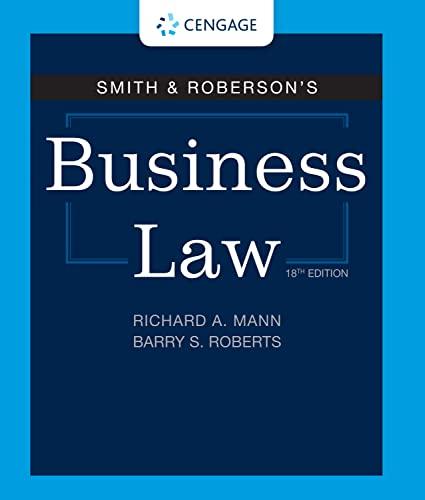Question
Due to shortages in the United States milk supply, Congress passed a law governing the production and sale of milk. The law required anyone who
Due to shortages in the United States milk supply, Congress passed a law governing the production and sale of milk. The law required "anyone who produced, distributed, or sold milk" to obtain a license from a federal agency, the United States Department of Agriculture (USDA), so that their production and sales could be monitored to ensure an adequate national milk supply. The law included Congressional findings that the cumulative effect of local milk sales substantially affected interstate commerce by decreasing interstate sales in certain areas resulting in decreased demand and distribution that ultimately affected larger areas and led to reduced supply and shortages for interstate sales. The law directed the USDA to develop a license application process and authorized the agency to impose fines for non-compliance. It also authorized the agency to seize milk supplies if necessary to address shortages.
Joanie is a small-town farmer in California who grows strawberries and has a small herd of dairy cows on her farm. She sells strawberries and milk at local farmer's markets and to a local Community Supported Agriculture (CSA) group. The USDA sent Joanie a notice that she was required to obtain a license and would be fined if she did not. Joanie ignored the letter and did not obtain a permit because she felt her local sales were insufficient to require a license. The USDA subsequently fined Joanie and seized her milk supply.
Discuss the commerce clause issues.
Issue statement:
Does the Commerce Clause allow Congress to regulate Joanie's local milk sales?
Legal standards/rule statement:
The Constitution provides Congress with the authority to regulate interstate commerce, which includes (1) channels of interstate commerce; (2) instrumentalities of interstate commerce; and (3) intrastate activities having a substantial affect on interstate commerce based on whether or not: (1) the activity is economic; (2) the law includes a jurisdictional nexus connecting the regulated activity to interstate commerce; (3) the law has congressional findings that make explicit connections to interstate commerce; (4) the regulated activity is part of a national regulatory scheme whose efficacy would be impacted if Congress could not regulate; and (5) the court has to "pile inference upon inference" to make the connection between the regulated activity and interstate commerce. Courts may also consider whether or not the activities at issue were an area of traditional state concern.
If the activity is economic, then courts can consider if the intrastate activity's aggregate or cumulative effect could substantially affect interstate commerce. Judicial review of congressional findings about activities having a substantial affect on interstate commerce is limited to whether Congress had a rational basis for the finding, as opposed to whether the activities actually had a substantial affect on commerce.
Analysis:
Provide your analysis here.
Conclusion:
State your conclusion here.
Step by Step Solution
There are 3 Steps involved in it
Step: 1

Get Instant Access to Expert-Tailored Solutions
See step-by-step solutions with expert insights and AI powered tools for academic success
Step: 2

Step: 3

Ace Your Homework with AI
Get the answers you need in no time with our AI-driven, step-by-step assistance
Get Started


